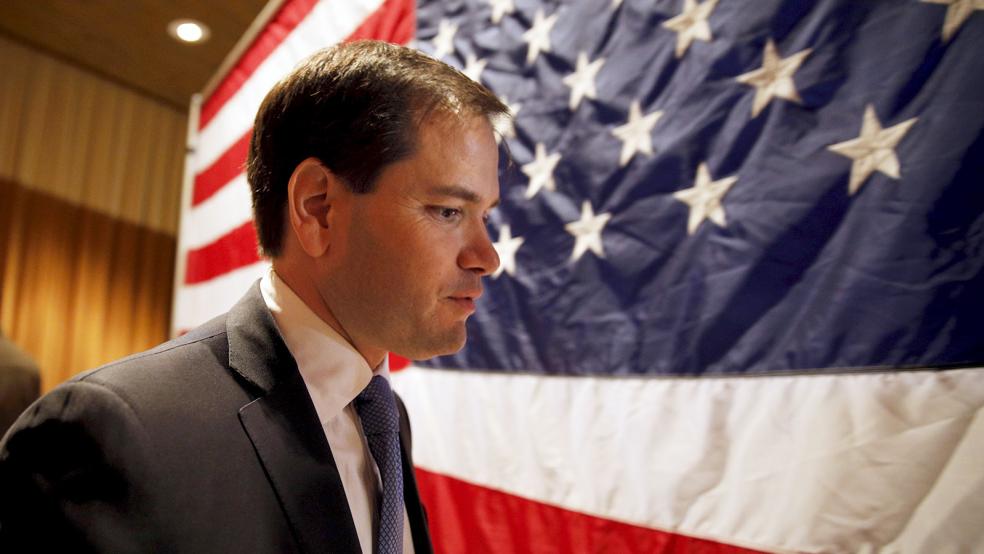Promises to wrest political power away from Washington, DC and deliver it to the people of the United States have been like giving away “Vote for Me” buttons in the Republican presidential primary. But with an op-ed in USA Today that went up late Wednesday afternoon, Florida Sen. Marco Rubio moved the goal post.
Saying the government has been “hijacked by politicians and bureaucrats who disregard the will of the people, rack up trillions in debt and expand the federal bureaucracy into more and more aspects of our lives,” Rubio called for a Constitutional Convention of the states – a never-used process vaguely outlined in Article Five of the Constitution – to rewrite the nation’s founding document.
Related: Insider or Outsider? Rubio Tries to Have it Both Ways
The promise, which Rubio has made in campaign stops since late December, provides a highly visible platform to an idea that has been percolating in conservative circles for decades, but which comes with a huge amount of uncertainty about how it would work and what its results would be.
The provision for a constitutional convention of the states as a method for amending the Constitution was included in the document at the insistence of George Mason and others among the founding fathers concerned that Congress would become a tyrannical body unresponsive to the will of the people. It directs that in addition to Congress being able to propose Constitutional amendments, that the various state legislatures should have the ability to do so as well, through a process that requires no Congressional approval.
Article Five obligates Congress to call a Constitutional convention if two-thirds of state legislatures request one. And if the convention approves amendments to the Constitution, they will be considered valid if three-quarters of the states ratify them. Again, the point is that all this would happen with no input from any of the three branches of the federal government.
It sounds relatively simple but the wording leaves major questions unanswered. For example, it provides no rules for how the convention would be organized, which has led academics who have studied the question to assume that the convention itself – like the original convention of 1787 – would have to write its own governing rules before getting down to business.
According to his op-ed, Rubio appears to believe that the scope of changes contemplated in a constitutional convention could be restricted to a few areas.
Related: How Trump’s Big Lead Could Fall Apart in a Hurry
“The amendment process must be approached with caution,” he wrote, “which is why I believe the agenda should be limited to ideas that reduce the size and scope of the federal government, such as imposing term limits on Congress and the Supreme Court and forcing fiscal responsibility through a balanced budget requirement. Limiting the agenda will prevent the convention from being overtaken by special interests.”
Limiting the scope of the convention, though, may not be so simple. The very point of the provision allowing states to launch an effort to amend the Constitution was to protect the ability of the people to change the way the country is governed without federal interference.
So, could anyone limit the scope of a convention? In theory, the states could collectively promise to do that in advance. However, the mandate of the original Constitutional convention was to simply amend the Articles of Confederation. By the end, the participants had scrapped them and produced an entirely new document, greatly exceeding their original mandate.
As noted by Michael Leachman and David A. Super here, many legal scholars think there would be no effective restraints on a constitutional convention once it was convened. Former Chief Justice of the Supreme Court Warren Burger wrote in 1988 that a convention in modern times “would be a free-for-all for special interest groups.”
Related: What Is a Hydrogen Bomb and Does North Korea Have One?
Again, Chief Justice Burger: “There is no way to effectively limit or muzzle the actions of a Constitutional Convention. The Convention could make its own rules and set its own agenda. Congress might try to limit the Convention to one amendment or one issue, but there is no way to assure that the Convention would obey.”
Or, as current Supreme Court Justice Antonin Scalia put it somewhat more pithily, “I certainly would not want a Constitutional Convention. Whoa! Who knows what would come out of it?”
Rubio, an attorney by training, is surely familiar with the Constitution. In his article, he is very careful in the way he refers to the role he sees himself playing in his proposed Constitutional Convention. He would “promote” it, he says. He would work “together” with the states, he says.
But one of the things that a plain reading of Article Five of the Constitution makes clear is that the President of the United States would have absolutely zero authority over any element of a constitutional convention.





